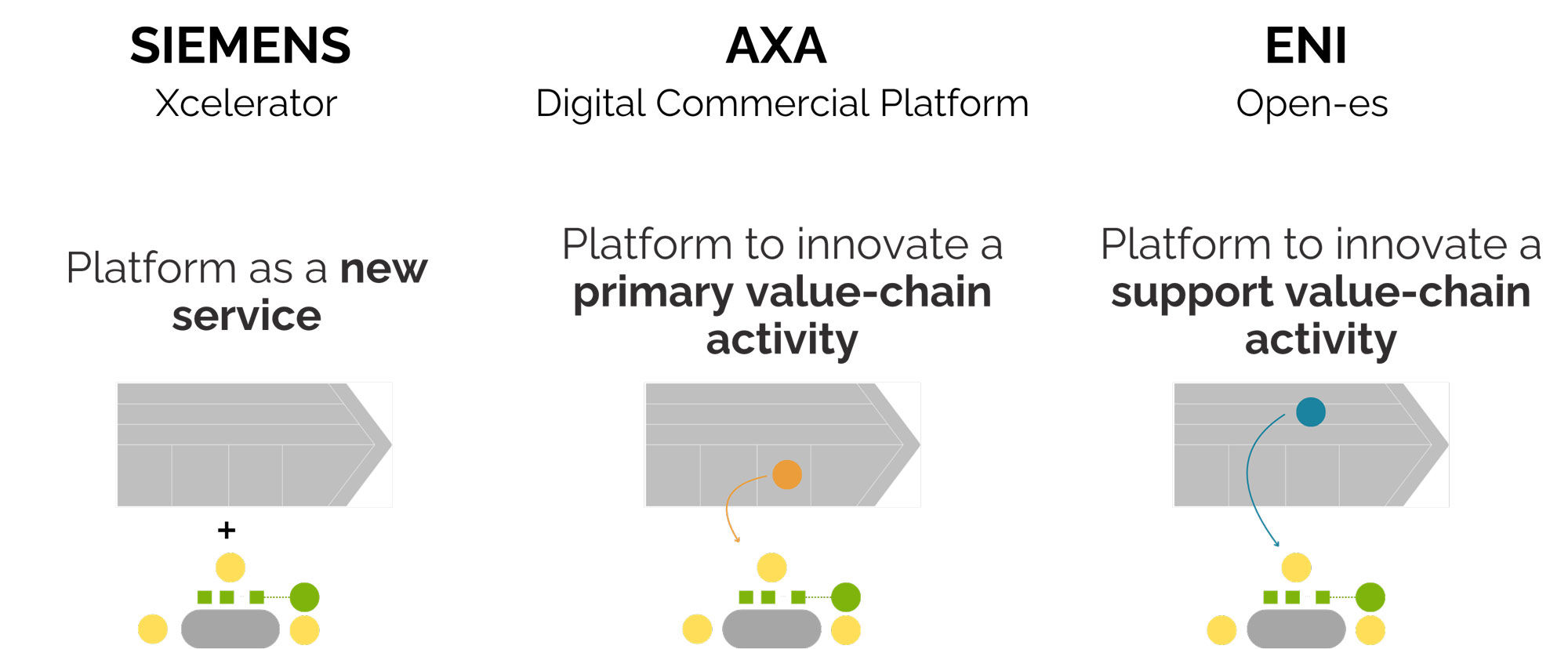Virtual Event

“Transformation doesn’t start with what you do. It starts with where you look.”
Across boardrooms and strategy offsites, one question echoes louder than ever: how can legacy companies regenerate themselves in a platform-dominated economy? Over the past decade, digital platforms have reshaped the business landscape – from how we move (Uber) to how we learn (Coursera) to how we relax (Spotify). But the real opportunity today lies not in copying tech unicorns. It lies in how established organizations can reimagine where they create value. This is the central idea of our new book: The Digital Phoenix Effect.
In the last three years, we conducted a comprehensive analysis of all S&P 500 companies and their platform-related initiatives. We mapped almost 800 projects that claimed to involve platform dynamics. But when tested against a rigorous definition, requiring multi-sided architecture and network effects in order to trigger stellar growth at quasi-zero marginal costs, only 140 passed. This is a powerful signal and tells us two things:
To understand where this shift leads, we studied three powerful examples – three “digital phoenixes” that reinvented themselves not by chasing trends, but by rethinking the very arena of their value creation.
Siemens, a titan of industrial excellence, faced an existential challenge: its legacy strengths – precision engineering and reliable machinery – risked becoming liabilities in an era dominated by agile digital-native competitors. Customers no longer wanted just superior hardware; they demanded seamlessly integrated digital solutions.
Rather than following the traditional path of costly internal expansions or cumbersome external partnerships, Siemens reimagined its future by embracing Platform Thinking. It created Xcelerator, an open innovation platform powered by APIs, allowing external developers to leverage Siemens’ advanced hardware and extensive IoT infrastructure. This strategic pivot instantly transformed idle assets – an enormous installed base, deep customer relationships, and powerful brand trust – into cornerstones of a collaborative digital ecosystem.
This bold move produced a new service offering and triggered strong network effects: the more equipment buyers joined, the greater the appeal to software developers, and vice versa. Such scalable growth was impossible via traditional methods, and certainly unreachable by any startup lacking Siemens’ immense industrial foundation.
AXA faced a critical challenge: climate change had rendered traditional actuarial models, built on historical data, ineffective in predicting increasingly severe natural disasters. Agile insurtech startups, leveraging real-time data, AI, and IoT, swiftly reshaped risk management, turning AXA’s deep underwriting expertise and trusted brand into potential liabilities.
Instead of adopting the costly, rigid approach of internal analytics teams or acquisitions, AXA chose Platform Thinking. It created the AXA Digital Commercial Platform (ADCP), a transactional marketplace connecting AXA’s B2B clients directly to specialized providers in climate intelligence, cybersecurity, and operational resilience, generating powerful network effects and richer predictive insights. This two-sided marketplace empowered clients to actively mitigate risks and offered providers trusted access to new customers, generating powerful network effects: more participants yielded richer data and more precise insights for everyone involved.
Internally, ADCP transformed AXA’s primary value-chain activities, particularly underwriting and claims management, by embedding dynamic, real-time intelligence into daily operations. Leveraging its unmatched idle assets – global risk data, regulatory credibility, and deep client relationships – AXA achieved operational agility and scalability beyond the reach of any startup.
Eni faced a critical challenge: mounting global pressures for stringent ESG standards threatened its ability to align thousands of suppliers – especially SMEs – with ambitious sustainability goals. Many smaller suppliers lacked the resources and expertise needed to measure, report, and enhance ESG performance, risking regulatory consequences and market competitiveness for Eni itself.
Instead of launching costly internal consulting teams or fragmented compliance programs, Eni embraced Platform Thinking, creating Open-es – a transactional marketplace linking industrial suppliers with specialized ESG service providers. Suppliers gained standardized, accessible tools to assess, certify, and improve sustainability practices, while providers accessed a qualified market at scale.
Internally, Open-es innovated Eni’s procurement, a support value-chain activity, embedding sustainability directly into compliance and supply-chain management processes. Network effects amplified the platform’s value: more participants generated richer data and better insights for the entire ecosystem. Leveraging unmatched idle assets – deep supplier relationships, procurement expertise, and trusted industry credibility – Eni rapidly scaled ESG transformation beyond what any startup could achieve.

Reframing Platform Thinking: What Legacy Firms Can Teach Us
The stories of Siemens, AXA, and Eni offer a powerful counterpoint to the startup-centered narrative around platforms. They show that legacy firms not only can do platforms – they can excel at them.
The lesson? Platform Thinking is not about chasing the future – it’s about unlocking the full value of the present.
Understanding where to apply platform thinking, whether adjacent to the core business, within primary activities, or deep in support functions, is just one dimension of the Platform Thinking framework. Our new book, The Digital Phoenix Effect, introduces this lens in depth, showing how legacy firms chose radically different entry points to spark regeneration. But the framework doesn’t stop there.
A second, equally critical dimension emerges from our research: the five business problems that platforms can solve. These include missing or inefficient transactions, evolving customer demands, innovation bottlenecks, underutilized data, and the lack of strategic insights from data. These are not abstract themes, they are the structural challenges we’ve seen again and again in our fieldwork across industries. And they point to why platform strategies are not just an option, but increasingly a necessity for incumbents seeking to remain relevant.
The Digital Phoenix Effect is grounded in rigorous analysis. We’ve mapped hundreds of platform initiatives across the S&P 500, examined how legacy firms apply platform logic to different parts of their business, and identified the patterns that separate symbolic moves from real transformation.
But this is also a book built for action. It offers a practical, four-step process to help companies uncover and activate the latent power in their assets. It includes workshop-tested tools (developed over three years collaborating with more than 20 legacy firms) like the Platform Thinking Cards Set, and a Platform Thinking Journey GPT to challenge, stimulate, and guide teams through the journey.
This is not a manifesto for disruption. It’s a guide for intelligent regeneration. For legacy firms, the future won’t come from starting over. It will come from seeing the business differently, and building from there.
By Daniel Trabucchi and Tommaso Buganza

Thinkers50 Limited
The Studio
Highfield Lane
Wargrave RG10 8PZ
United Kingdom

Thinkers50 Limited
The Studio
Highfield Lane
Wargrave RG10 8PZ
United Kingdom

Thinkers50 Limited
The Studio
Highfield Lane
Wargrave RG10 8PZ
United Kingdom
| Cookie | Duration | Description |
|---|---|---|
| LANG | 9 hours | Linkedin set this cookie to set user's preferred language. |
| nsid | session | This cookie is set by the provider PayPal to enable the PayPal payment service in the website. |
| sp_landing | 1 day | The sp_landing is set by Spotify to implement audio content from Spotify on the website and also registers information on user interaction related to the audio content. |
| sp_t | 1 year | The sp_t cookie is set by Spotify to implement audio content from Spotify on the website and also registers information on user interaction related to the audio content. |
| tsrce | 3 days | PayPal sets this cookie to enable the PayPal payment service in the website. |
| x-pp-s | session | PayPal sets this cookie to process payments on the site. |
| __cf_bm | 30 minutes | This cookie, set by Cloudflare, is used to support Cloudflare Bot Management. |
| Cookie | Duration | Description |
|---|---|---|
| l7_az | 30 minutes | This cookie is necessary for the PayPal login-function on the website. |
| Cookie | Duration | Description |
|---|---|---|
| CONSENT | 2 years | YouTube sets this cookie via embedded youtube-videos and registers anonymous statistical data. |
| _ga | 2 years | The _ga cookie, installed by Google Analytics, calculates visitor, session and campaign data and also keeps track of site usage for the site's analytics report. The cookie stores information anonymously and assigns a randomly generated number to recognize unique visitors. |
| _gat_gtag_UA_10408481_1 | 1 minute | Set by Google to distinguish users. |
| _ga_ZP8HQ8RZXS | 2 years | This cookie is installed by Google Analytics. |
| _gid | 1 day | Installed by Google Analytics, _gid cookie stores information on how visitors use a website, while also creating an analytics report of the website's performance. Some of the data that are collected include the number of visitors, their source, and the pages they visit anonymously. |
| Cookie | Duration | Description |
|---|---|---|
| NID | 6 months | NID cookie, set by Google, is used for advertising purposes; to limit the number of times the user sees an ad, to mute unwanted ads, and to measure the effectiveness of ads. |
| test_cookie | 15 minutes | The test_cookie is set by doubleclick.net and is used to determine if the user's browser supports cookies. |
| VISITOR_INFO1_LIVE | 5 months 27 days | A cookie set by YouTube to measure bandwidth that determines whether the user gets the new or old player interface. |
| YSC | session | YSC cookie is set by Youtube and is used to track the views of embedded videos on Youtube pages. |
| yt-remote-connected-devices | never | YouTube sets this cookie to store the video preferences of the user using embedded YouTube video. |
| yt-remote-device-id | never | YouTube sets this cookie to store the video preferences of the user using embedded YouTube video. |
| yt.innertube::nextId | never | This cookie, set by YouTube, registers a unique ID to store data on what videos from YouTube the user has seen. |
| yt.innertube::requests | never | This cookie, set by YouTube, registers a unique ID to store data on what videos from YouTube the user has seen. |
| Cookie | Duration | Description |
|---|---|---|
| DEVICE_INFO | 5 months 27 days | No description |
| loglevel | never | No description available. |
| m | 2 years | No description available. |
Thinkers50 Limited has updated its Privacy Policy on 28 March 2024 with several amendments and additions to the previous version, to fully incorporate to the text information required by current applicable date protection regulation. Processing of the personal data of Thinkers50’s customers, potential customers and other stakeholders has not been changed essentially, but the texts have been clarified and amended to give more detailed information of the processing activities.